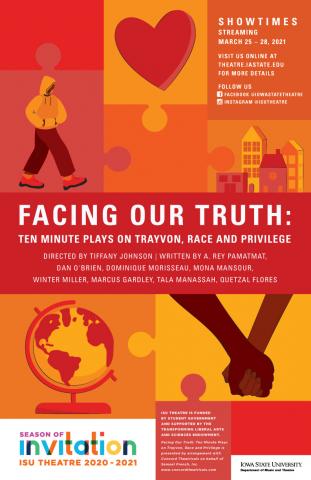
Facing Our Truth
by Susan Gent
We’ve faced a lot of truths about ourselves, about technology, and about our communities over the past year.
Iowa State University (ISU) Department of Music and Theatre invites us to continue this self-exploration as they present “Facing Our Truth: Ten Minute Plays on Trayvon, Race and Privilege.” The show streams March 25-27 at 7:30pm and on Sunday, March 28 at 2pm. The link can be found at their website: www.music.iastate.edu. Those attending the Thursday performance are invited to ask the cast and director questions in a post-production Zoom event which is supported by Ames Public Library and the Ames Branch of the NAACP.
The production is directed by ISU Theatre Guest Artist in Residence Tiffany Johnson, who is also the Artistic Director of Pyramid Theater Company, the only Black Theatre organization in Iowa. Johnson brings fierce community advocacy, passion for the arts and inspiration as an educator to this powerful theatrical production.
“Facing Our Truth: Ten Minute Plays on Trayvon, Race and Privilege” is comprised of six-plays which include a folk opera, a colorful subway ride, a satire and other thought-provoking pieces. Johnson explains that these stories offer various angles for the audience to explore their own discomfort, assumptions, and implicit biases around race and privilege. She said that by embracing the plays’ emotional nature, the audience feels what the stories intended them to feel.
As the cast explored an array of characters and plots, they tested out uncomfortable, vulnerable spaces. Johnson said the foundation of building any external character is knowing oneself. “When the world is blurry, it’s hard to know who you are”. As director, she challenged each actor with reflective, personal questions during the process. Part of the work is also to understand what it’s like from having witnessed, experienced or felt a range of emotions. This difficult interior work builds more believable, authentic characters for the stage.
As a founding member of Pyramid Theatre Company, Johnson says “in Black theatre we see… trauma come up in some of our performers because of the relived experiences of oppression that we are portraying. Those feelings are very resonant and very visceral and palpable, because we still oftentimes experience it.”
Johnson says as casts “push toward those [complex] feelings—we use art to not just to work for everyone else but allow it to work for [us] as artists, to protect that part of [us] too”. She encourages each cast member to leave emotions that no longer serve them- like grief or hurt or sorrow--behind, “on the stage” and to take only what they need moving forward.
By becoming grounded storytellers, the cast realizes that they “don’t own what the character is saying, but own the fact that [they] are willing to be the vessel for that story to be told.”
Between each of the six plays Johnson weaves student monologues which further explore race and privilege, revealing hope and resolve. In one monologue the speaker recounts a high school incident and, with the insight hindsight allows, wonders if they made the right decision.
“I’m so proud of these students for being so vulnerable”, says Johnson. Facing Our Truths “makes all the difference in the world”.
Ames Public Library is proud to partner with ISU Theatre and the NAACP on this production. For further examination around race, privilege and implicit bias, check out these resource guides at Ames Public Library:
“Race in America” recommendations include in nonfiction, Black voices in fiction, and conversation starters for talking with children and teens.
The new “Black Book Nook” is a special collection which fosters education and community engagement with Black history, thought, literature and culture. The collection was created in partnership with the ISU Office of Diversity, Equity and Inclusion.